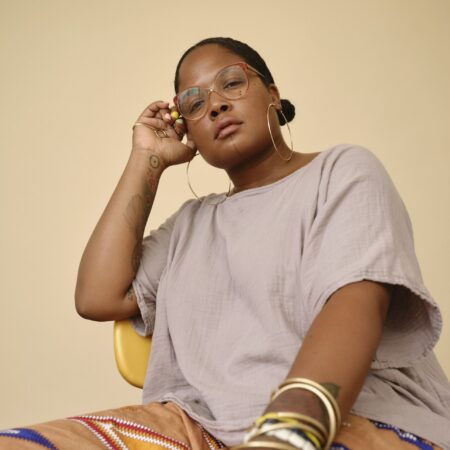With more than 22 years of experience in the healthcare industry, Cindy Eckert (formerly Whitehead) is a highly regarded women’s health advocate and serial entrepreneur. She has founded and sold two businesses for more than $1.5B, and served as CEO for Sprout Pharmaceuticals where, in 2015, the company broke through with the first-ever FDA-approved drug for low sexual desire in women; dubbed “female Viagra” by the media. Currently, she’s helming The Pink Ceiling — a cross between a VC firm, a ‘pinkubator’ and a consulting enterprise — which she founded in 2016.
Cindy sat down with The Helm’s CEO Lindsey Taylor Wood for a conversation about entrepreneurship, injustice, regulation, and changing the conversation about women and sex forever.
Lindsey Taylor Wood: Preparing for this interview, I couldn’t help but notice a dearth of female entrepreneurs in the field of sexual medicine. Have you come across many other women like yourself who are innovating in this industry?
Cindy Eckert: Viagra opened up a huge lens into men’s health and then health in general, [but] when you innovate in sex there is often a picture that goes far beyond that. We’ve learned so much even from brain scan studies about the biology of sex, particularly with women; there have been a lot of recent discoveries. But if I look at women in the field: there are brilliant women in the research space, there are clinicians inside of female sexual health. In the corporate world, not so much. We don’t see in women’s health, as a general rule, the kind of early-stage innovation and development that I’d want to see because the hurdle seems so high. In essence, we prevent companies from pursuing active R&D in things that are specific to women.
We don’t see in women’s health, as a general rule, the kind of early-stage innovation and development that I’d want to see because the hurdle seems so high.
LTW: Even thinking about your own story, your trial included 11,000 people, you had already sold a company, you had spent a decade leading in the field and yet, initially, your drug wasn’t approved. Our bodies have been legislated for so long, but after the research I’ve done and the conversations we’ve had, I can’t help but wonder if our pleasure is being regulated too. How do we tackle that?
CE: I have thought to myself more times than I can count on my fingers and my toes, “why didn’t I just develop a diabetes medication?” And here’s why I say that: if you don’t have diabetes you are unlikely to have an opinion about it, but, I’ll be damned if you don’t have an opinion on sex. And those opinions absolutely create biases because our view of sex is imposed on to others. Our normal, our experience, we project onto others as what their normal and their experience should be. Navigating all of those opinions makes for some pretty incredible discussions, but they are missing the science altogether.
And, that’s what ignited me: science had given us the answer, but we were ignoring it because we were making value judgments based on our own bias. We have got to have an evidence-based discussion around sexuality. And, for me, the evidence-based discussion of sexuality for women is not ignoring the biological basis of things that go wrong.
Science had given us the answer, but we were ignoring it because we were making value judgments based on our own bias. We have got to have an evidence-based discussion around sexuality.
LTW: You talk about the need to change the narrative. What do you think the narrative is and what do you think the narrative needs to be?
CE: The narrative is that all things related to sex for men are biological and all things for women are psychological — and we love to do that across all of women’s health. Historically, women who had a biological basis to their dysfunction, a medical basis, were not getting access to a medical treatment. We dismissed them repeatedly, patting them on the shoulder and saying, “Oh, go watch 50 Shades of Grey”. We were dismissing the fact that something was going on for them in terms of an imbalance of key brain chemicals that was outside of their control. There were already 26 different treatment medications for sexual dysfunction for men when we finally broke through with the first for women.
We need to have to have that conversation, and the way we have it is twofold: one, education inside of the medical school system. They too are human beings with their own sexual experience, reservations, and bias in how they talk about sex. You have to be conscious about that in terms of education, how you can’t impose your own view onto others. The second part is that women have to demand better. They really have to, you’ve heard me say that I’ve had a front-row seat in what it means when women advocate, not only for themselves but for each other. That’s what makes the difference.
LTW: Isn’t part of changing the narrative also about framing the economic opportunity? Because it’s unreasonable to me that people don’t understand that if 50% of the population doesn’t have the drugs that they need to go about life in a way that is healthful and meaningful to them, there is a massive economic opportunity. And if it’s not about bias, then what other rationale would there be for the blatant omission of that reality?
CE: There is no rationale. It’s bias. Data has long since spoken, but we have to get out of our own way and listen. I found repeatedly as I was having conversations throughout this process, other people would say, “These women, who want more sex.” What does ”these women” mean? There was an automatic judgment in terms of who “these women” are, and it’s not just gender [bias].
There were already 26 different treatment medications for sexual dysfunction for men when we finally broke through with the first for women.
I was on a call with a reporter and she had read the story of one of the patients who had responded to our clinical trial. She said: “Come on, I’m 38 years old. Sometimes my husband wants to have sex, I want to eat a burrito. Who are these women who want to be having sex all the time?” And I said, “I’m going to stop you right there because what you’re doing is imposing your own normal. She was basically saying, these women are going to impact my view of sex and her notion was all wrong. For those women it would be a luxury to be able to say, “honey, not tonight.” They’ve literally never had desire for sex, it didn’t matter if they were on a vacation of a lifetime in Paris, something had changed for them and it was gone. They had experienced that loss and it had broken everything down, not only in the bedroom but at the breakfast table.
When I started talking her through that, I said, “Do you have any girlfriends with depression?” She said, “Yeah, I do.” So, I said, “Do you ever look at them and say hey, suck it up, life sucks.” And she was kinda horrified like, “No, I never do that.” I said, “Why not?” She said, “Because, it’s a medical condition.” I said, “Exactly.” Bias runs deep culturally and in each one of us, particularly as it relates to sexuality.
Come on, I’m 38 years old. Sometimes my husband wants to have sex, I want to eat a burrito.
LTW: You’ve said justice is something that drives and motivates you, specifically, as it relates to access to capital. But I wonder if it isn’t also about “intimate justice”, something I heard Peggy Orenstein speak to in her TED talk. She says Intimate justice, a framework developed by psychologist Sara McClelland, is “the idea that sex has political as well as personal implications just like who does the dishes in your house or who vacuums the rug. And it raises similar issues about inequality, about economic dexterity, violence, physical and mental health. Intimate justice asks us to consider who is entitled to engage in an experience, who is entitled to enjoy it, who is the primary beneficiary, and how does each partner define good enough.” Does that resonate with you?
CE: Oh absolutely, I love that.
My career is marked with injustices in the many ways I have been an outlier, the unexpected in the room. When people imagine a pharmaceutical CEO who sold a business for a billion dollars, me in a hot pink dress does not come to mind. So, it’s about shifting those perceptions.
I do today, inside the Pink Ceiling, absolutely fight injustices: one, is a woman’s lack of access to capital (for all of the reasons you talked about, there’s great economic opportunity), and access to mentorship because we haven’t seen women get to certain leadership levels. There is a huge disconnect in who is mentoring and sponsoring the next wave of women leaders.
I also think back on my pharmaceutical career and it absolutely, particularly Sprout, was fueled by the injustice that women with a medical condition didn’t have access to a medical treatment. I came into it having built a company with one of the male sexual health drugs, so I was very clear on what that path was and it was scientific. I was amazed as I got into Sprout how different those conversations were and how different that process was going to be. That ignited, I think, an advocacy that has spilled over into the Pink Ceiling and really dictated what my work was going to be post-exit.
When people imagine a pharmaceutical CEO who sold a business for a billion dollars, me in a hot pink dress does not come to mind.
LTW: I remember when I met you, about a year and a half ago, hearing your story and thinking 1) you were a modern-day Erin Brockovich and 2) I couldn’t believe more people didn’t know about this David and Goliath struggle between you and the FDA. Can you share more about that? Because when we talk about explicit bias, this is a glaring example.
CE: Inherently, there is unconscious bias in sexuality, but, for sure, there was explicit bias at many points along the way. The FDA is made up of many people— smart people, well-intended people, good people—and then there are folks who, like we see across all industries, are leaders who are not leading by example. When I was rejected by the FDA, it blew my mind, honestly. I had a data set which I met my outcomes with statistical significances, these were pre-specified endpoints, agreed upon with the FDA. I submitted this data package, which we were very proud of because of the numbers and sheer volume in testing we’d done in women, and then we got a rejection.
There was also a moment in which there was a discussion about not using the word menopause on the label and using “the change” instead. I went sideways on that. I’m glad to say that we have menopause on the label but the fact that we were even having that conversation in 2015 is eye-opening.
To the FDA’s credit, they opened their doors and they listened to patients. Patients should always be the center of conversation in areas where we don’t have treatment, where we need input of what it’s like to live with it, of what the definition of success would be. So we had a big meeting where we invited women with the condition and asked them a variety of questions. The FDA had a panel and they got all of this input. It was brave for these women to show up and share their most intimate stories to a federal agency—not exactly easy to do, inspirational to be sure—and then there’s a time at the mic for public comments. I’ve got to tell you, a young woman, who was not diagnosed with HSDD, got up and said, “Hey, I have an idea for you, find a different partner or get more familiar with your showerhead.” It was appalling. She completely ignored that this is a medical condition that we characterized in the 70’s— one that has been in all of the diagnostic manuals for decades. I had a number of complete shocks during this process.
When I was rejected by the FDA, it blew my mind.
LTW: So, you finally get the drug approved and you sell it for a billion dollars only to find out that the company that purchased it didn’t fulfill their obligations to market and distribute it the way they said they would. Was there a specific moment when you decided “I have to get it back?”
CE: I can’t think of a particular defining moment but having exited stage left as the founder with the dream for the baby, I had to wait and to understand that in someone else’s hands they might not do it exactly the same way as me, and give room for that. But if someone else wasn’t going to because of time, or focus, or resources, whatever that was, I was going to figure out how to. Success has never been for me necessarily defined by sales, I think the world would like for it to be defined by sales, but that’s not my definition of success. My definition of success is education and genuine access. I want to change the conversation about women in sex forever. It was always about getting it right for women. Always.
LTW: One thing I found curious was that you weren’t listed as a shareholder for the purchase. What is your role as a shareholder and/or executive moving forward with this?
CE: I’ve not yet announced that, but, I’m absolutely, as one of the founders, an important shareholder. You mentioned we bought it back, but we were actually given it back for nothing. In return for that, we dropped a lawsuit, because as we constructed the deal, there were some pretty rigorous performance obligations in terms of those efforts put forth around education and access and things that were so important to me as a founder for my baby to be adopted, and when those weren’t met we decided that that was the right path. So, we got the drug back for nothing.
I want to change the conversation about women in sex forever. It was always about getting it right for women. Always.
LTW: You’ve been quoted as saying: “Leaders who aren’t socially conscious aren’t leaders at all. They must be serving a bigger purpose.” I wanted to dive a little bit deeper into that. Do you think every company needs to have a double bottom line or is it more that CEOs and founders should be mindful of things like equal pay and clean supply chains?
CE: I would say that what it means for me is how you use your power and not every company is going to have a social mission product, per se. Companies that are really important in our lives with products and services that we use aren’t necessarily going to have that double bottom line but they can still create social impact. Let’s take Dove as an example. They’re selling you soap. Are they necessarily a social impact product? No. But look at what they did with provoking the definition of real beauty. They took their power and leadership in the market and did something that had a social consciousness. I have fair pay inside my organization, I have equal pay for equal work, I have a responsible maternal health policy. All of those things are crucial. I do think you have to have a social consciousness today about how you’re using your power in the market for good — or inside of your company. How are you leading by example there?
LTW: You raised a hundred million dollars for Sprout from outside the valley. How much of that hundred million came from women and what has your experience been like trying to bring more women to the table to invest in female-founded companies?
CE: Oh, I love this question. So, a majority of that capital came from women. My strategy was to tell everybody my story and hope that it would grow the way that women so powerfully do in terms of telling one another about the things that really count. It grew from one contact to a group of their friends and so on and so forth and now I have this extraordinary national base who are mission-aligned with what we’re trying to do. And I can often put the call out and bring those same resources to bear in these new opportunities that I’m excited about. Thank goodness, actually, that I had to do this, it wasn’t the design. Who I am, the subject matter I was dealing with… the odds were stacked against me. By the numbers, by everything, the odds were stacked against me from getting traditional venture capital. It was lucky that I had to figure out how to do it differently because they hung with me in the process. They weren’t managing me to the spreadsheet every time the FDA said, “that will be another three million dollars, that will be another seven million dollars.” I went back to them, held my hand out and said “this is what we’ve got to do,” and they were in it for the big picture return of what we were trying to change here. And it wasn’t just financial impact.
It makes all the difference when women are sitting on the investment side of the table in terms of the projects that are getting green-lighted. I consider these people dear friends and really so important in terms of the behind-the-scenes work to fuel change. So, it’s so good what you’re doing. We have to get women investing. We’re controlling the wealth and more of the wealth that’s coming is going to women. Investment is important in that equation.
It makes all the difference when women are sitting on the investment side of the table in terms of the projects that are getting green lighted.
LTW: You said in a previous interview, “Ownership is the path to freedom.” I love that and I want to know more about what that means to you.
CE: If I look back at those companies that I founded and sold, Slate and Sprout, my single greatest accomplishment was making everyone an owner. So, whatever you did in the company you had skin in the game. Ownership is the path to not only financial freedom but freedom to do those things that really ignite you. Having brought people in who had been stars in conventional environments but didn’t have the same skin in the game, or the same permission to be themselves, bringing into that environment, making them owners, watching those outcomes, I really have witnessed this ripple effect of ownership. They’re now starting their own companies, they’re funding their children to start their companies, they made totally different career choices, having spent that time in the Slate or Sprout environment than they would have had they been on a more predictable path. That’s what it’s all about. Right? You spend so much time at work, you better love what you do and I have really watched that whole group do it. I love the ripple effect of ownership.
LTW: What’s new in your portfolio that you’re excited to talk about?
CE: The wearable tech for detection of date rape drugs in drinks is perfect for The Pink Ceiling, not only being an innovative-first but really being a catalyst in a social conversation we have to have. I have a wonderful female founder in Houston, Jessica Traver, who is going to reinvent the spinal tap. She’s a young engineer doing something that is so important inside of the medical system because of the lack of state-of-the-art today. She’s wonderful. I have a woman with a biometric sensor that can flag young athletes as they may be approaching injury so that nobody has a career-limiting injury. There’s so many I want to talk about… I got involved in a company just recently that’s developing a device to prevent children from drowning. The most preventable form of death under five is actually drowning. It’s a wearable. Our hallmarks are: is it a disruptive first, and is it important in a cultural conversation for women? These female founders are extraordinary and they are pretty much all geeks like me, scientist, engineers, and I want to see them win.
LTW: What does success look like for The Pink Ceiling? Where are you 10 years from now?
CE: Success for The Pink Ceiling in the simplest term is to make women really rich and then watch them pay it forward. It is that ripple effect of ownership, I’m gonna help these young women get to the next level and then watch how they get the next group to the next level. That’s really the goal. 10 years from now… God, 10 years from now, the work won’t be done, I’ll still be going. That’s my 10 years from now.
Cindy Eckert is a groundbreaking entrepreneur who currently serves as the CEO and founder of The Pink Ceiling — the investment firm, ‘pinkubator’ and consulting enterprise with a mission to mentor, invest in, launch and build other women-led or focused businesses. Cindy has been a featured speaker at Fortune’s Most Powerful Women, Fast Company’s Innovation Festival, SXSW and Inc. Women. She is a graduate of Marymount University and currently lives in Raleigh, North Carolina. You can’t miss her; everything Cindy touches turns to pink.






